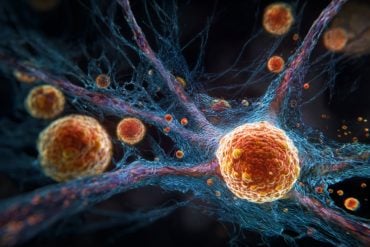Summary: While seeking support via social media doesn’t necessarily harm mental health, it doesn’t help it either. However, real-life social interactions can have a positive effect on mental health.
Source: Michigan State University
Social media may make it easier for people to engage online, but I does not provide certain benefits of real-life human interactions, says a Michigan State University researcher.
“Problematic social media use has been associated with depression, anxiety and social isolation, and having a good social support system helps insulate people from negative mental health,” said Dar Meshi, an assistant professor in the Department of Advertising and Public Relations at MSU. “We wanted to compare the differences between real-life support and support provided over social media to see if the support provided over social media could have beneficial effects.”
The research was published online April 29 in the journal Addictive Behaviors.
While social media support did not negatively impact mental health, it did not positively affect it either.
“Only real-life social support was linked to better overall mental health,” Meshi said. “Typical interactions over social media are limited. We theorize that they don’t allow for more substantial connection, which may be needed to provide the type of support that protects against negative mental health.”
Meshi and Morgan Ellithorpe, an assistant professor in the Department of Communication at the University of Delaware and a co-author on this paper, conducted a survey of 403 university students to identify how problematic their social media use was and their degree of social support in real-life and on social media.

By also using the PROMIS, or Patient-reported Outcomes Measurement Information System, scales for measuring depression, anxiety and social isolation, the researchers could see how the students’ social media use and social support related to their mental health.
Problematic social media use is not a recognized addictive disorder, but there are similarities in the symptoms of someone with a substance use disorder and a person displaying excessive social media use. Examples include preoccupation with social media and signs of withdrawal, such as irritability, when prevented from using social media.
“It appears that the more excessive one’s social media use is, the less social support that person gets in real life, which leads to poor mental health,” Ellithorpe said.
Meshi and Ellithorpe encourage people who are using too much social media to reach out to people in real life for social support.
About this psychology research news
Source: Michigan State University
Contact: Caroline Brooks – Michigan State University
Image: The image is in the public domain
Original Research: Closed access.
“Problematic social media use and social support received in real-life versus on social media: Associations with depression, anxiety and social isolation” by Dar Meshi, Morgan E. Ellithorpe. Addictive Behaviors
Abstract
Problematic social media use and social support received in real-life versus on social media: Associations with depression, anxiety and social isolation
Social media platforms allow people to connect with each other and obtain social rewards. In some individuals, these reinforcing rewards can induce maladaptive, problematic social media use, with symptoms similar to substance use disorders. This problematic social media use has been associated with poorer mental health.
Previous studies have demonstrated that social support can protect against poor mental health.
People can receive social support both in real-life and on social media, however, so we investigated whether these two types of social support mediate the relationship between problematic social media use and poor mental health.
We conducted an online survey, collecting measures of problematic social media use and mental health (depression, anxiety, and social isolation), as well as measures of real-life social support and social support received on social media.
We then performed a path analysis on these data. Our analysis revealed that problematic social media use was significantly associated with decreased real-life social support and increased social support on social media. Importantly, real-life social support was then associated with reduced depression, anxiety, and social isolation, while social support on social media was not associated with these mental health measures.
Our findings reveal the value of real-life social support when considering the relationship between problematic social media use and mental health. Implications for further research and practice are discussed.







